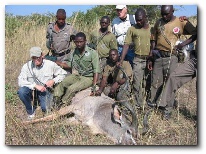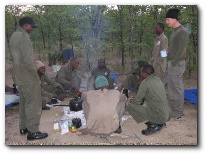News & Updates
Team and volunteers with snared kudu
Early morning Kalambeza 3Cº
Zimbabwe, Newsletter September 2008
Dear readers,
In September we started to feel that Zimbabwe is warming up again and
gave us a preview what is still to come in the months ahead, which will be
the hottest months of the year.
The first days of this month we were (still) patrolling in the Gwayi, after the
raids in the end of August.
In general we can say that the areas near to our home base (Hwange Safari
Lodge) are relatively clean. The occasional snare is found (for instance some
18 small ones for francolins and other birds and here and there one or two
for mammals) but on the whole the situation is under 'control'.
In the other areas in the Gwayi there are serious problems. We have now
visited many different farms and are getting more and more of a picture
what is going on in terms of snaring of animals.
Especially in the farms were the owners do not pump any water and were
there is no natural source of water, the farms are sometimes empty. Empty
means no mammals to be seen and no spoors of them to be found. No
droppings, no footprints, no claw marks, nothing. Just the thousands of
mopane bees (small bees) to keep you company, or rather drive you crazy,
whilst they try to suck moisture out of your eyes or wax from your ears! A
sad thing to see and very boring to patrol if there are no traces of anything,
not even a duicker or stein buck. There seems to be a lot of 'harvesting'
(hunting) but very little investment in the farms.
'Telephoneteam'
In the Stakeholder meeting the issue of old telephone wire was highlighted.
The old wire is hanging down at a lot of places and abused as snare wire by
many poachers. The Telephone Company does not have enough resources
to remove these wires. The stakeholders (or at least some of them under
which ALL4AP) pledged diesel and money to get a crew from 12 local people
going for at least a month to extract all these old copper wires. The
telephone team started on the 29th of this month, so more about this the
coming month.
ALL4AP pushed hard and even took the lead in organising this operation
since we are the once that are constantly confronted with carcasses with
copper wires on them. We have also been maintaining our own deployments
and the training of a new anti poaching unit for our sister organisation.
We are working with a sense of urgency now as the raining season is coming
(it starts between October and November) and it will be much harder to keep
the patrolling effort going in the wet conditions.
Many people benefit (financially) from wildlife (directly, weather hunting or
photographic tourism), and yet remain unwilling to take part in anti poaching
operations. It is very sad to have to draw such a conclusion. Nevertheless,
we continue our efforts to keep wildlife out of snares and remain hopeful that
our contribution will eventually cause them to see the benefits and begin
supporting the work.
Luckily in the areas where there is water, we do see animals and even
endangered ones like a few White Rhino's. We are monitoring all sightings of
Rhino's, Lions and African Wild Dogs, and maintain data of sightings and
spoor incidences for research purposes.
More and more we come across Lions (there is still a ban on Lion hunting),
but unfortunately we have not seen any spoors from the African Wild Dogs
this year.
This month the total of snares recovered was 161 in which nine animals were
found dead (7 Bush bucks and 2 Impala's) however, This month no arrests of
poachers were made.
Best regards, Martin & Team
Team after a successful clean up
operation in ‘Chimwara’ Farm











